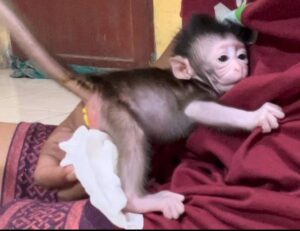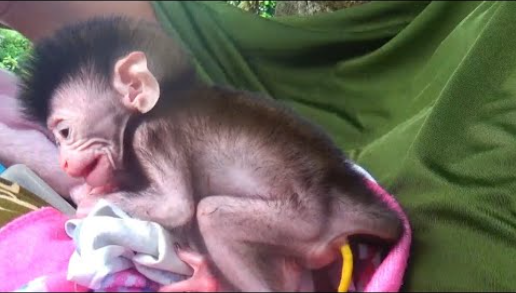Taking care of a baby monkey is a significant responsibility and requires a lot of time, effort, and resources. It’s essential to be well-informed and prepared. Here are some general guidelines on how to care for a baby monkey:

1. Legal Considerations
- Check Laws and Regulations: Make sure it’s legal to keep a monkey as a pet in your area. Many places have strict regulations or outright bans.
- Permits: Obtain any necessary permits or licenses.
2. Nutrition
- Formula Feeding: Baby monkeys need a special formula similar to what human infants need. Consult a veterinarian who specializes in primates to get the right formula.
- Solid Foods: As the monkey grows, gradually introduce fruits, vegetables, and specially formulated primate biscuits.
- Hydration: Ensure the monkey stays hydrated. Provide fresh water at all times.
3. Housing
- Secure Enclosure: Provide a large, secure enclosure with plenty of space to climb and explore. Monkeys are very active and need lots of room.
- Temperature Control: Ensure the environment is kept at a comfortable temperature, as baby monkeys can be sensitive to cold.
- Enrichment: Provide toys, branches, ropes, and other items to keep the monkey stimulated.
4. Health Care
- Veterinarian: Find a veterinarian who specializes in primates. Regular check-ups are crucial.
- Vaccinations: Keep up with necessary vaccinations and parasite control.
- Emergency Care: Be prepared for emergencies. Know the signs of common illnesses and have a plan for immediate veterinary care if needed.
5. Social Needs
- Companionship: Monkeys are social animals and need interaction. If you can’t provide enough social interaction, consider getting another monkey.
- Bonding: Spend a lot of time with your baby monkey to establish trust and a strong bond.
6. Training and Behavior
- Positive Reinforcement: Use positive reinforcement techniques to train your monkey. This includes rewarding good behavior with treats and praise.
- Socialization: Expose your monkey to different environments, people, and situations to ensure it is well-socialized.
7. Safety
- Childproofing: Just like with human babies, you need to childproof your home. Remove any hazardous items that the monkey could get into.
- Supervision: Never leave a baby monkey unsupervised, especially with small children or other pets.
- https://www.youtube.com/watch?v=FdEUlOPleyA&ab_channel=AnimalWorld
8. Long-term Commitment
- Lifespan: Monkeys can live for many years (some species up to 40 years). Be prepared for a long-term commitment.
- Financial Responsibility: Caring for a monkey can be expensive. Factor in the costs of food, veterinary care, housing, and enrichment.
9. Ethical Considerations
- Wildlife Conservation: Consider the impact of keeping a monkey as a pet on wildlife conservation efforts.
- Adoption: If possible, adopt from a rescue organization rather than buying from a breeder.
10. Educate Yourself
- Read Books and Articles: Educate yourself thoroughly about the species you are caring for.
- Join Support Groups: Connect with other monkey owners and experts through online forums and local groups for support and advice.
Conclusion
Caring for a baby monkey is a complex and demanding task that requires a deep commitment and a thorough understanding of their needs. Ensure you are fully prepared and informed before deciding to take on this responsibility.
